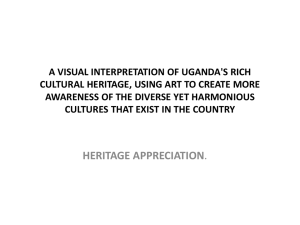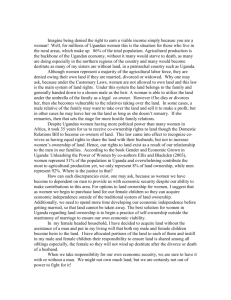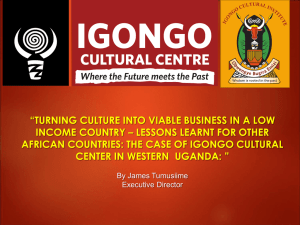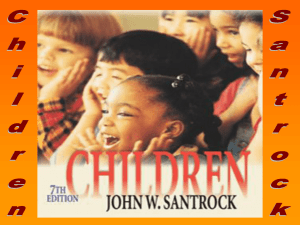The Cultural School Festival at St. Luke Community Museum under
advertisement
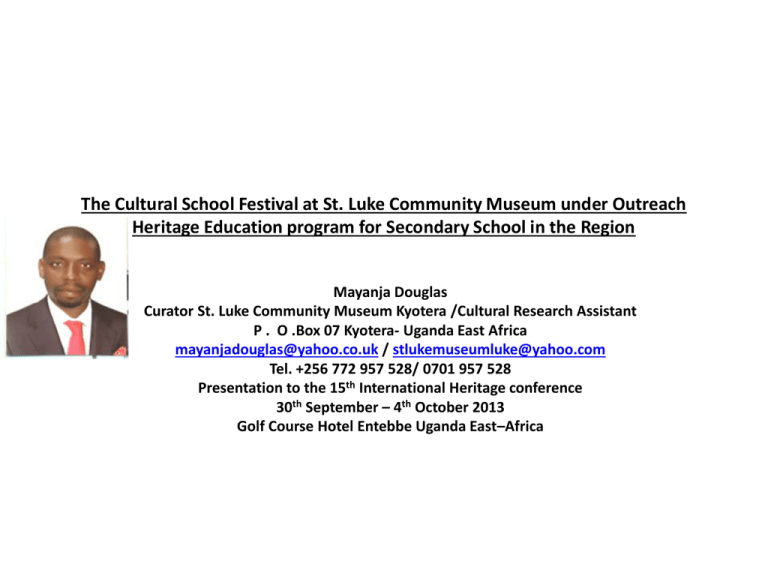
The Cultural School Festival at St. Luke Community Museum under Outreach Heritage Education program for Secondary School in the Region Mayanja Douglas Curator St. Luke Community Museum Kyotera /Cultural Research Assistant P . O .Box 07 Kyotera- Uganda East Africa mayanjadouglas@yahoo.co.uk / stlukemuseumluke@yahoo.com Tel. +256 772 957 528/ 0701 957 528 Presentation to the 15th International Heritage conference 30th September – 4th October 2013 Golf Course Hotel Entebbe Uganda East–Africa • • • • • • The outreach heritage Education school festivals held at St. Luke Community Museum is supported by The Cross-Cultural Foundation Uganda, unlike our daily exhibitions, the purpose and disbanded after the event. If there perpetuated themselves they do not continuously but periodically. At first, the policy and programme at the centre reflected the view and interest of what and how cultural heritage and documentation of the oral history through schools heritage clubs festivals once a year at respective Museum. This special school programme is intended to present an artistic impression rather than function manner. Now I feel that the establishment of the programme is our major focus on the community museums as place of cultural values and instrument to promote African unity in most cases, national unity, to empower youth in secondary schools with cultural tolerance/ appreciating one another’s and also the need to enhance culture as peace and reconciliation in the country. The civil wars from 1966 – 2005 when Konyi was rooted out of the country (Northern Uganda) almost destroyed the very fabric of society. In addition man degraded environment which caused an impact on the cultural heritage all leading gradual deterioration and subsequent disappearance of our rich heritage which now needs younger generation to understand the importance of conservation. The pragramme is potential for tangible and intangible culture heritage embedded with traditional elders with knowledge, skills and practices who are the custodians of oral history . This is innovations that introduced heritage clubs in Secondary Schools for last three years. The prsent ethnic groups were given opportunity to show-case their cultural objects. During the exercise various aspects related to the traditional ethnic groups are displayed in respective varieties of different activities to exhibit and bring the heritage sites. This also exhibited the landscape for economic activity, homestead with tools for defense and hunting. Honestly, it is evident that displays express intangible and festival setting. Since the objects on display are usually not objected in truthful sense but mostly live performance, of different intangible cultural and practice an festival acts as a primary agent of our cultural conservation and a stage for construction and consolidation of our national identity formation. In our club we experience and appreciate different cultures within a single nation Uganda, thus creating harmony into our societies. Also, the outreach Heritage Education School clubs festival presentation at the museum disseminates cultural understanding of popular form and promotes the artistic and aesthetic values of the various Ugandan ethnic groups. In respect it may not be possible to resolve the many misunderstandings that existed among different Ugandan people (ethnicity) but it is possible to ask for more cultural tolerance and awareness of one another through cultural festivals expression. Most of conflicts in Uganda are motivated political differences, poverty and lack of understanding the importance of tolerance in communities. This divide people on basis of traditions, languages, and cultural ethnics groups, such as Baganda, Banyankole, Acholi and Langi. The festival helps school children to understand one’s identity and also help them to appreciate their differences and relationship to another. Which in turn create harmony in communities to • • • • • More significantly, the presentation by heritage school clubs festivals create a public forum for cultural criticism and provide raw materials for stage preservation of Ugandan cultural traditions through musical and dance shows, cultural ceremony performances, poems, folks and portray of regional costumes and bodily dormant that are rapidly receding in public memory. Our students have managed to share treasures of indigenous knowledge and beliefs systems for example student present oral history that interpret the traditions of heritage with full of hidden meaning which is translated on stage in a respective manner. Under the course we identified the resource full people who explore Uganda’s experience and promote the cultural tolerance and promotion of pluralism among student from diverse ethnic groups. Our continent is characterized by conflicts; these are the ethnic wars and discrimination and for example, what happened in Rwanda in 1994, the unprecedented genocide which left millions of people slaughtered. In Uganda, we have 56 ethnic groups many have bitter filling against others. For example the herd men with Banyoro and Basongola and Bakonzo, even in war time those sentiments rise up and result into unnecessary killings. The fighting groups such the former regimes which was formed almost by one ethnic group killed people from the central region around 1980- 1986 and we have memories of the massive graves in Luwero triangle which are preserved to witness the atrocities of the war. Therefore I think that the students will emphasize the spirit of tolerance and appreciation of other people’s culture for better Uganda. This is challenged by allowing all ethnicity to stage their culture for other to watch and learn however some negative culture like spiritual worship which result into human sacrifice, women circumcision, early marriages for girl child, cow resoling ere discouraged. In Uganda Obote tried to copy from the Arusha declaration of 1967 “state interventions and control of the civil societies and establishment of National Service Institution”. The native authority were abolished because were directly associated with ethnicity which was conceptualized by the sate as something evil and threat to national unity. When Obote introduced The Common Man’s Charter and he went ahead to abolish chieftains including the powerful Kabaka of Buganda, the situation ended up by overthrowing Obote’s regime in 1971 by Idi Amin. The only solution is to appreciate one another culture and have freedom of expression among the people, at the end Ugandans will be much focused on their identity and avoid unnecessary ethnicity sentiments which can create division among societies. • • • • The Ugandan cultures must be conserved and protected and preserved by National museums and community museums respectively such as oral histories and ethnographic objects however, the schools are the basic area to empower the practices and skills of the lost cultures. It is precisely this nature and character of vital activity that makes the school clubs festivals in Uganda. This symbolically constructed popular image of Ugandan school national’s culture by serving as platform for the conservation. When practicing our cultural identity everyone is proud of one another culture and never to hear any developing conflict of ethnic relations. Also the fundamental cause for such a danger begins with economic prosperity and its consequences. My observation along the African region ethnic conflicts in various countries in Africa underlay to be found in socio-economic struggle and economic competition for national resource, that’s when the competition and struggle reach the stage of conflict. Other factors are the religion and ethnic differences. TRADITIONAL WEAR STUDENTS CULTURAL EXPRESSION CULTURAL CEREMONIES CULTURAL GAMES CULTURAL ECONOMIC activity EXHIBITION AFRICAN DISHES PARENTS TEACHERS
